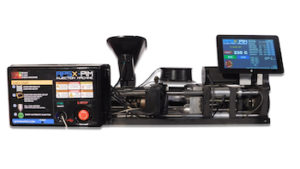Kubi Kara and his partner, Burak Cevik, never thought they would be in the injection molding business, but as they say, necessity is the mother of invention.
Kara, a mechanical engineer who has an MBA from Xavier University in Cincinnati, and Cevik, who has a bachelor’s degree in civil engineering, met while both were attending Xavier’s MBA program.
Together they founded Advanced Production Systems (APSX; Blue Ash, OH), developing unique, simple tools for industry and consumers including RFID readers (APSXRFID), aftermarket auto parts and accessories, robotics and consumer electronics, which they sell to customers around the world.
APSX-PIM desktop injection molding machine Kara and Cevik wanted to design some small plastic components for their automotive aftermarket parts business that had them looking at a better and more cost-effective way to obtain these parts. That’s when the idea of molding these parts themselves took hold.
“But mold prices are incredibly high,” Kara told PlasticsToday. “A mold for this small plastic part was $15,000. Investing in an injection molding machine was a minimum of $50,000. So in thinking how can we make this happen more cost effectively, we decided to make our own machine, which we did and we have used it for two years to make our own parts.”
Kara soon discovered there was a big demand for desktop injection molding machines. “We found there is a huge market for people like us who want to mold their own plastic parts using their own injection molding machine, but without the large upfront investment,” Kara said.
“The APSX-PIM was born as a redesigned and optimized model of the original machine, and purposely designed to make plastic or metal injection molding (MIM) cost effective and easy to apply for prototyping, testing, new product development and low-volume part production.”
The desktop APSX-PIM (patent pending) is an alternative to desktop 3D printing with a number of benefits that 3D printers do not offer. In addition to being convenient for use in engineering, product development and plastic part design labs, the new APSX-PIM offers repeatability and results in better quality parts.
“Injection molding is much better than 3D printing in that you can get the same results every time through the machine settings,” Kara explained. “3D printing repeatability is not there—there’s more variability—and in terms of plastics, the APSX-PIM uses regular resin pellets.”
The APSX-PIM includes a 10-in. touch screen to start and stop the machine, adjust settings and monitor progress in real time. In spite of its compact size, the APSX-PIM is a fully automatic, 110-V electric powered machine with a 1200-W heater. It is 4-ft long, 1-ft deep and 1-ft high and weighs 250 lb.
The machine features a compression spring, heated barrel with motorized plunger, with a 1.83 cubic inch shot capacity, and it can hold a 6-by-4.8-in. mold base.
It works with steel, aluminum or CNC cut inserts and 3D-printed molds, and the machine can mold a variety of plastic resins, including ABS, acetal, HDPE, PP, PS and TPO.
Since it uses only air to cool the mold area, there is no need to have a dedicated water supply; while the cycle time is a bit slow, as a result, it is much faster than a 3D printer.
“Our typical cycle time is about 60 seconds,” Kara said. “The fan on top of the molding area is controlled electronically. It requires setting the temperature of the mold at a specific degree, and when the fan needs to come on, it will do so automatically and at different speeds, depending on temperature requirements. It’s fully automated so when you push the button to start the machine, it’s basically hands off.”
Kara noted that the price of the APSX-PIM is one of the primary differences between their machine and a competitor’s “desktop” molding machine—it is about one-third the price, which makes the APSX-PIM very affordable.
APSX’s primary targets for the new molder are full- or part-time CNC machinists, product design studios, high-tech medical equipment manufacturers, engineering and technical schools and DIY hobbyists and inventors. The APSX-PIM will be featured on Kickstarter this month, where Kara and Cevik hope to raise $50,000 “to get things rolling.” It will be made in the USA at the company’s Cincinnati facility.



